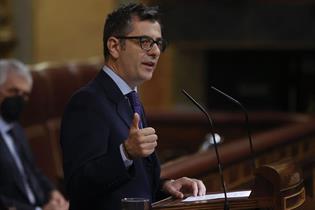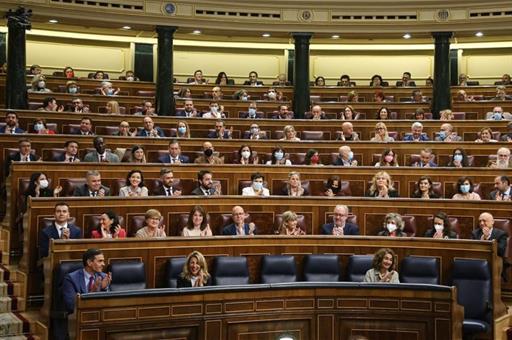Government of Spain gains approval of anti-war impact measures to make life easier for citizens
News - 2022.4.28
The Minister for the Presidency, Parliamentary Relations and Democratic Memory, Félix Bolaños, defended the measures in the Lower House of Parliament which, he said, only have one purpose: "to protect and help Spaniards from the impact of a war on the doorstep of the European Union".
For this reason, the Minister for the Presidency reminded MPs that citizens elected them as their representatives "to help them and make their lives easier, and I regret to say that those who are voting no to this decree today are harming the citizens with the sole aim of damaging the Government".
Bolaños assured that governments do not choose the crises they will have to manage, but rather the way in which they deal with them "and this government's recipe is to protect and help people and companies by strengthening the welfare state and deepening the modernisation of the economy by advancing in digitalisation and the ecological transition".
In his speech, the minister explained the measures that the Government has been implementing for months and which have been reinforced as a result of the war in Ukraine. "The reality is that when we go to the supermarket, filling the shopping trolley is more expensive; when we go to the petrol station, filling the tank also costs more. Farmers, fishermen and hauliers have seen their costs rise, which is why the Government has been taking measures for months to protect economic growth and the purchasing power of citizens. In this regard, the minister reiterated the measures adopted by the Government related to energy that have reduced electricity bills by 60% and have meant 7 billion euros in savings for families and businesses since the measures came into force in 2021.
Support measures in four blocks
 Foto: EFEIn his speech, Félix Bolaños analysed the measures of the Royal Decree-Law in response to the economic and social consequences of the war in Ukraine, which is structured in four blocks: energy, transport, support for companies and the self-employed, and support for workers and vulnerable people.
Foto: EFEIn his speech, Félix Bolaños analysed the measures of the Royal Decree-Law in response to the economic and social consequences of the war in Ukraine, which is structured in four blocks: energy, transport, support for companies and the self-employed, and support for workers and vulnerable people.
1. Measures related to energy
- The tax reduction on electricity bills is kept and the competitiveness of the electro-intensive industry is supported with an 80% reduction in tolls until the end of the year. These measures will result in savings of around €225m, benefiting 600 companies.
- The regulation also includes direct aid to gas-intensive companies in sectors such as paper and cardboard, glass and ceramics. €125m, which will benefit some 1,600 companies (88% SMEs). Profits from electricity production are also regulated. This measure will free up €1.8bn to be used to reduce electricity bills.
- In line with energy transition and sustainability policies, the RDL makes it possible to speed up renewable energy projects.
2. Transport measures
- In the field of road transport, a set of agreed measures has been adopted, injecting more than €1bn into the sector. Direct aid amounting to €450m is available to companies and self-employed hauliers. Thus, for each lorry, hauliers will receive 1,250 euros and for each van, 500 euros.
- The regulation is also specifically aimed at supporting maritime transport and, among other measures, port charges are lowered.
3. Support measures for businesses and the self-employed.
- €10bn in guarantees to provide liquidity to companies and the self-employed.
- In addition, direct aid to the most affected productive sectors is approved. €169m for the production of milk from cattle, sheep and goats, affecting some 19,000 beneficiaries in total. €193.4m for farmers and €68m for fishermen. This amount includes compensation for additional production costs until July and direct aid, which will benefit approximately 7,600 vessels.
- The RDL also includes specific measures for the film and industrial property sector, a very important sector, which is in the process of recovery after being badly affected during the pandemic.
4. Support measures for workers and people most in need
- A discount of 20 cents on every litre of fuel until 30 June. It is worth highlighting the enormous effort made by the Administration to implement this measure, as more than €300m in advance payments has already been made to service stations and companies, 97% of those that have requested it.
- Limit on rent increases, for three months, set at a maximum of 2%. On rent of 600 euros, the measure could save more than 33 euros per month.
- On jobs, the Government keeps the policy of protecting workers in times of difficulty and therefore establishes the ban on companies that receive direct aid or ERTEs with public support from making dismissals.
- It also includes an extraordinary increase in the Minimum Basic Income benefit of 15%. The MBI is already helping more than one million people. Special mention should be made of the special treatment given to women who are victims of trafficking, who are being given easier access to the MBI and referral to assistance resources through a more streamlined process.
- The electricity social voucher has been extended to 600,000 families, so that it will reach 1.9 million households. In addition, the requirements for accessing the voucher have been lowered and it is extended to cohabitants who do not form a family unit.
- Finally, the RDL includes specific measures for displaced Ukrainians, with additional amounts to cover their care. In particular, measures are adopted to protect minors, whether accompanied or unaccompanied, and of possible victims of trafficking in human beings and sexual exploitation.
Iberian Agreement
In his speech, the minister highlighted the political agreement that Spain and Portugal have reached in Europe on the price of energy. After arduous negotiations in Brussels, it will be possible to limit the gas price, currently at €90, to around €50 per MWh, starting at 40 MWh.
In short, the RDL develops a very ambitious plan that will mobilise €16bn to combat the effects of the war (€10bn from the ICO facility and €6bn in direct aid and tax rebates).
Non official translation





